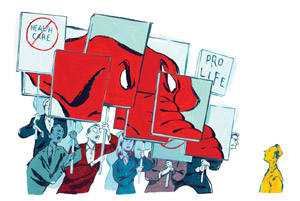
Rep. Bart Stupak (D-Mich.) is not running for reelection. | Congressional office photo.
Remember Rep. Bart Stupak? The Michigan Democrat was a source of immense frustration for liberals during the health care debate. He spent months leading a small group of pro-life Dems who opposed the bill because they (incorrectly) thought it funded abortions. Stupak eventually settled for an executive order promising that no health care funding would be used for abortions, and it seems that he’ll soon be out of the spotlight for good, as he’s retiring in January. But will Stupak’s departure—and the fallout from the health care fight—mark the end for his breed of Democrat? I recently explored the possibility in an article for the print magazine. It’s now available online:
Pro-life Democrats come in two varieties: those who tout anti-abortion views on the stump, but largely end up voting with their pro-choice colleagues, and those—typically hailing from deep-red districts—who almost always vote pro-life. As abortion foes mobilize against “faux” pro-life Dems in November, you might think they were going to focus on the first group. But they’re really gunning for the second, traditionally the movement’s staunchest Democratic allies. We’re talking congressmen with ratings of 80 percent or higher from the National Right to Life Committee.
In May, abortion opponents claimed the scalp of the first member of this pro-life cadre—longtime Rep. Alan Mollohan (D-W.V.). The Susan B. Anthony List (a pro-life political action committee founded to counter the pro-choice powerhouse EMILY’s List) spent $78,000 to help defeat him in the primary, and has pledged to spend a total of $1 million to unseat other alleged traitors to the pro-life cause. With most of those members already in tough races, and other anti-abortion groups embracing similar strategies, at least a half-dozen pro-life Dems could be headed for defeat this fall.
Here’s the rest of “Mommy, What’s a Pro-Life Democrat?“
The outlook for pro-life Dems has arguably worsened since the print magazine came out. Nate Silver, the New York Times’ polling guru, says Steve Driehaus (D-Ohio) and Kathy Dahlkemper (D-Penn.), two key members of the Stupak bloc, each have just an 8 percent chance of holding onto their seats. (My colleague Maddie Oatman has more on how the abortion fight has affected the Driehaus race.)
Marcy Kaptur (D-Ohio), who drew a deeply flawed opponent in Nazi reenactor Rich Iott, will likely survive. But Rep. Brad Ellsworth will almost certainly lose his Senate race in Indiana, where Reps. Joe Donnelly and Baron Hill also face tough races. So do Chris Carney and Paul Kanjorski in Pennsylvania.
Other avowedly pro-life Dems, like Marion Berry (D-Ark.) and Charlie Melancon (D-La.) are not running for re-election. (Melancon is in a Senate race against David Vitter, and will probably lose.) Even longtime Rep. Nick Rahall could be in trouble in West Virginia. If Rahall loses, Kaptur would almost certainly be the only representative who attended Stupak’s eleventh-hour press conference still serving in Congress come February. The Stupak bloc will have paid a heavy price indeed for backing health care reform.













